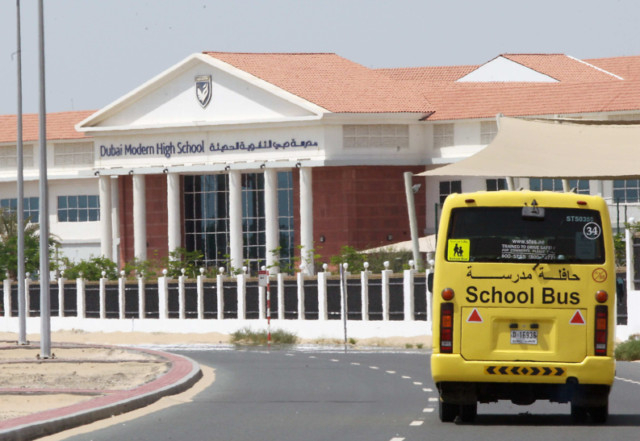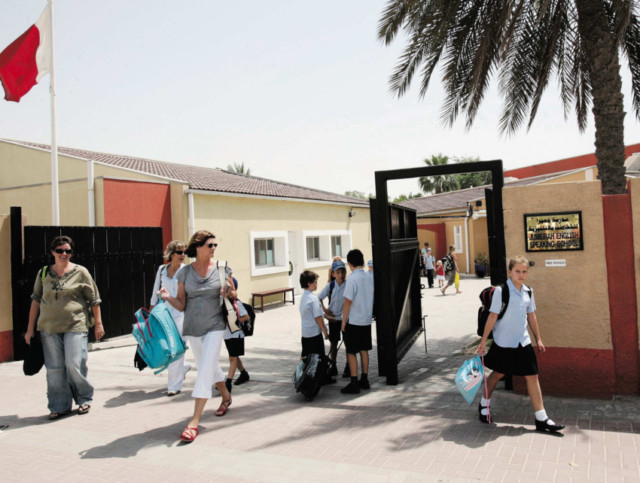
Dubai: “I must have tried at least 30 schools,” said Tejathi Roy, an exasperated Indian expat looking to move to Dubai from London.
Having failed to get her three- and-a-half-year-old daughter enrolled in any school, she was at the Expatwoman Education Fair on March 4 to make one last try. “My daughter and I may have to go back to the UK as she has not got a seat anywhere so far. I never thought it would be so difficult.”
Another mother, Seema Hirani, said finding a primary school for her daughter has been nothing short of “a nightmare”. “I’ve applied to at least 10 schools. One of them called her for an assessment but by the time I enquired about the fee — which was within 24 hours — they were full.”
Yes, school admissions in Dubai have become a mad scramble.
This despite the city having 150 schools with 12 more coming on board for the academic year 2013-14.
New openings
A spokesperson for the Knowledge and Human Development Authority (KHDA) told XPRESS: “Twelve new schools are expected to open in the academic year 2013-14 - five Indian curriculum schools and seven British/IB schools. The 12 schools will have a total physical capacity of 28,730 students, with a first year enrollment projection of about 5,000 students.”
Yet seats are scarce.
“There were queues extending up to a kilometre when I had gone to collect a token for the lottery for KG1 admissions at Indian High School. And all this for just 100 seats from several thousand applicants,” said the father of a three-year-old.
Registrations have barely begun and several schools have already closed their waiting lists due to oversubscription.
R.D. Stokoe, Director of the Jumeirah English Speaking School (JESS) in the Arabian Ranches, said: “The lists are significant (2,000-plus) with high levels of interest across the 3-18 age phases. We have closed a number of these waiting lists due to oversubscription. In terms of class size, our maximum is 22 students per class which is well within government expectations given the size and scope of our teaching facilities.”
It’s the same rationale in other schools too. A spokesperson for GEMS, which has over two dozen schools, said: “At GEMS schools we aim to keep our waiting list numbers below 300, and once this number is reached, we close registrations for that year group. In some schools and in some year groups, the number of students on a waiting list could easily surpass 1,000, but the probability of them getting a place in that school is limited.”
Much of this rush is in the primary classes. Dawn Rennie, admission’s officer at Taaleem’s Dubai British School (DBS) which has also closed its waiting lists, said: “Foundation Stages 1 and 2 are always extremely popular year groups … DBS has already closed waiting lists for some year groups due to the high number of applications received. We believe it is unfair to accept applications from prospective parents because these age groups have a high demand and it is unlikely that we will be able to accommodate them.”
But why are schools oversubscribed? Anxious parents said they have no option but to register their wards in a number of schools as they cannot afford to take a chance. Otherwise, they could end up like this British mum who tried her luck in just one school.
“We came to Dubai two years ago and wanted our four-year-old son to get into the Dubai English Speaking School (DESS) as we were told it is the best. We didn’t apply anywhere else because we totally believed he would get in here. But he didn’t make it as he was shy, tired and jet-lagged and didn’t perform in the few minutes that he was assessed,” said the mum.
She claimed that the family did not receive any feedback about the assessment until she called to find out. She said she had to hunt for an alternate school at the last minute. “Fortunately, he got a seat in the Uptown Primary School in Mirdif.”
An Indian couple who have also picked DESS as the first choice for their three-and-a-half-year old daughter said they are applying in other primary schools as well for FS2 2014. The mother Chaitra Prabhakar said: “It will be difficult because we have limited our choice to British schools. They are structured, routine-oriented and provide a multi-cultural environment which is what we want for our daughter.”
Besides personal preferences, parents have to contend with other aspects like quotas for siblings and student movements within the same group of schools.
Time factor
There’s also the time factor and the ability to pay the sizeable amounts that admissions cost.
The GEMS spokesperson said: “It is never too early to start enquiring about admission to the school of your choice. Because of the variety of curricula offered, GEMS schools open admissions at different times and these schools have varying admission procedures that take siblings and other GEMS students into account.”
Juliet Gerbich from Barbados said her two-year-old son would go to a nursery this September, but she is already looking at a suitable primary school for him.
With many schools opening registration 18 months prior to the academic year, even a slight delay can nudge prospective parents out.
The DBS officer said: “We realise that some parents may have recently relocated to Dubai, sometimes at short notice, and to apply for a place 18 months in advance is not always possible... we ask parents to contact us about available places and visit our website for up-to-date information.”
As for the cost, most schools charge a Dh500 non-refundable fee for registration. “Even if I am applying in a minimum of four schools, I end up spending Dh2,000,” said a Sri Lankan father looking for a primary school for his son. Add to this the Dh5,000-Dh7,000 that the child must pay if he is to secure his seat when he clears the assesment and the expense becomes sizeable. “I may even have to forfeit this if the school of my first choice admits him later,” he said.
So, what’s the solution?
KHDA attributes the seat shortage to a rapid rise in population and children being waitlisted with more than one school.
Demand and supply
“Established schools offering good quality education tend to fill quickly and have long waiting lists. This is due to the increasing population in Dubai and the migration of students from other schools … as long as there is an increase in the number of seats offered, it will be a solution to the capacity issue. It doesn’t matter whether it is an expansion by a current school or the addition of a new school — both approaches will increase the number of seats offered,” said the KHDA spokesperson, adding that it is encouraging greater investment in the school sector.
Clive Pierrepont, Director of Communication at Taaleem which runs 10 schools, said: “There is an imbalance in the availability of places in some areas, particularly the early and primary years. Government bodies, regulators, school operators and investors must work closely together to anticipate and provide sufficient places for the demand in years to come. As the regulatory bodies have recognised, demand will only be satisfied when sufficient private operators and investors are encouraged to make the long-term investment in schools that is needed to service it.
“The recent freeze in school fees has not encouraged established, reputable operators to accelerate their growth plans. The 2012 ECI (Educational Cost Index) announcement stated that educational costs had declined. Many operators, such as ourselves, are greatly concerned that this announcement bore no resemblance to the reality of the situation where costs in real terms have increased between five and 10 per cent. Any future announcements of this nature will have a detrimental effect on the appetite for investment in new schools.”
The KHDA spokesperson said: “While the demand for school seats is more in some schools and in some curricula than in others, there are schools that begin the academic year with spare capacity. “There will always be a school in Dubai that will accept your child. Parents can admit their child in that school for a year and in the meantime, continue to seek admission in the school of their choice.”














